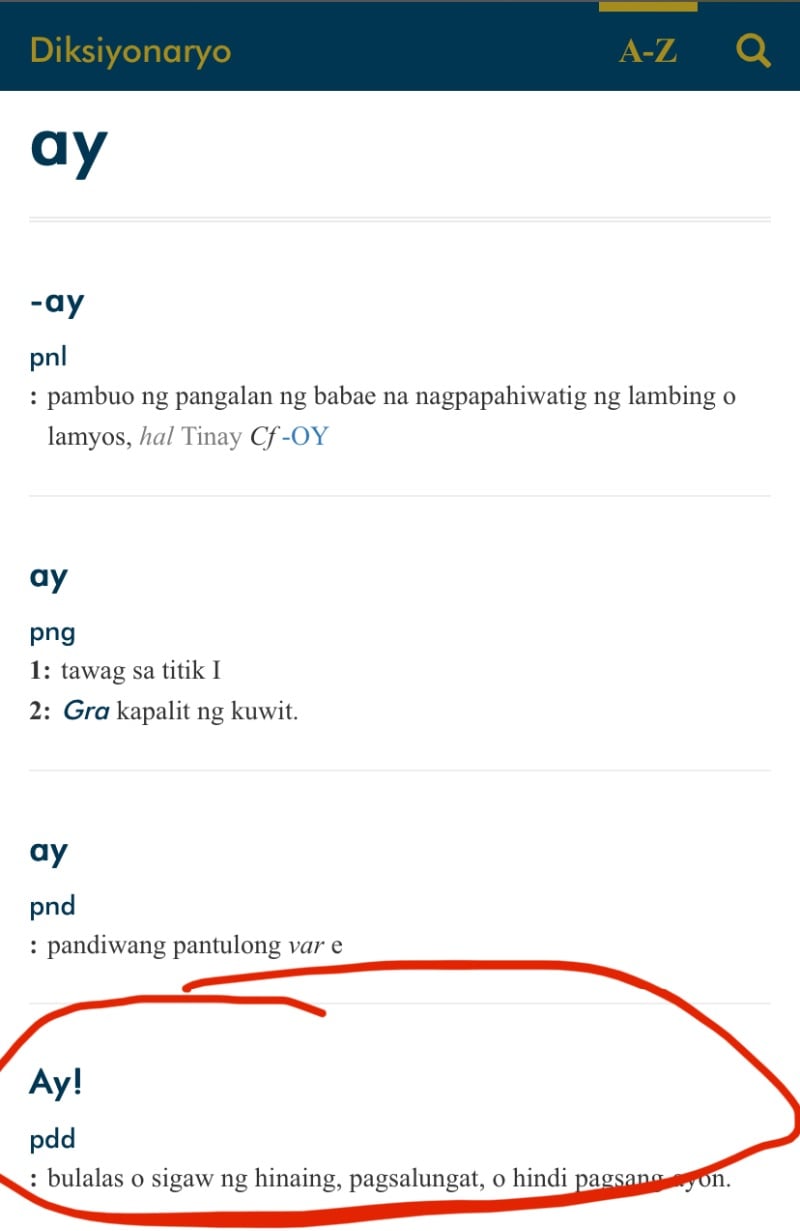@OmpongIbarra
Actually it matters because it changes the way we look at how Tagalog sentences are constructed. And the statement is not profound. It's only exhaustive and I do not think that it's should be belittled. Actually, it's healthy to study words no matter how "diminutive" they may be. The study of words is called lexicography. To insult the attention given to a single term such as 'ay' is ignorant.
This dismissive attitude towards the tendency in exhausting our understanding about language is myopic. Questioning even the little things are important.|
For example:
Your expression the use of 'ay' in "Ay naku!" is wrong and misspelled.
It should be 'Hay' because it is an interjection of grievance, exhaustion, or disappointment. Whereas 'ay' is only a sentence inverter and does not have any meaning. Instead, it has a grammatical function which is more syntax-based rather than semantic-based. That means, it's about implied structural function compared to overt associated meaning.
So, instead of "Ay naku!," it should have been "Hay naku!" "Ay naku!" was either written carelessly or a sentence fragment waiting for a psuedo-simuno or subject with a wrong punctuation which can ultimately change what naku would mean. "'Psuedo-simuno' ay naku." See, it matters.
But obviously, since I'm a native speaker and understand what you were trying to IMPLY, these things may not matter to people like me given that I can use my cultural understanding and context clues to figure out what could be perceived as wrong construction. However, this is not okay. Especially, now, in the 21st century, we are plagued by amateurish attitudes towards the study of local language because the global capital demand does not side with the local languages but the English language. As you can see, this Tagalog.com site is not even monolingual because it serves a general audience. We hardly even find monolingual dictionaries at all. Other dictionaries are made lazily with transliterations rather than actual translations which both do have their benefits and limitations. In short, the Tagalog language and its local terms are not being learned. We have extremely assimilated with European culture which 'ay' as a 'diminutive' particle is a token of our trauma.
This is a dictionary site. There are more people who are careless about grammar or who would not even give the time and attention to analyze words and syntax thoroughly. So I take with offense belittling the effort of exhaustive discourse. Instead, act with obnoxious attitude of "anything goes" and "basta yun". This kind of amateurism should not be tolerated within the ranks of people understanding the language seriously.
Imagine if people teaching arithmetic did not care about the order of variables in a subtraction equation, they would flip. But when it comes to syntax and the use of 'ay' with a comma before the term is seen WITHOUT regret or attention. If you try to check the government's KWF grammar book, the composition was written poorly. It was like a person who translated an English composition and carelessly "translating" it to Filipino. Who the **** uses a comma before the term 'ay' apparently the greatest minds of the 21st century in the country. It is sickening. They call themselves standardized. Yes, my rant goes way deeper, and the likes of you are like these geniuses running the country and being paid hefty amounts of money just to write for the sake of writing and being paid by honest tax payers for such a book the no one would probably read because they have ****ed every chance of learning local languages. They don't give a **** and the likes of you carelessly saying 'Ay naku'. Nakakabuwiset!








